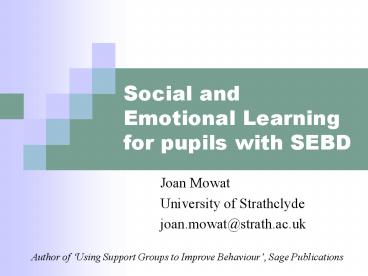Social and Emotional Learning for pupils with SEBD - PowerPoint PPT Presentation
1 / 24
Title:
Social and Emotional Learning for pupils with SEBD
Description:
Groups of 3-6 pupils meeting weekly with a Support Group Leader. Intervention spans approx. 20 1hr ... How is this construed by the individual pupil and others? ... – PowerPoint PPT presentation
Number of Views:67
Avg rating:3.0/5.0
Title: Social and Emotional Learning for pupils with SEBD
1
Social and Emotional Learning for pupils with SEBD
- Joan Mowat
- University of Strathclyde
- joan.mowat_at_strath.ac.uk
Author of Using Support Groups to Improve
Behaviour, Sage Publications
2
- Background to the Study
- The Study
- nature of
- context of
- research questions
- methods
- findings
- issues
3
Background to the Study
4
A Personal Journey
Making a Difference
5
What are Support Groups?
- Groups of 3-6 pupils meeting weekly with a
Support Group Leader - Intervention spans approx. 20 1hr sessions
- Pupils have been identified as being in need of
additional support by Pastoral Care Teachers - Support Group Leaders are members of staff who
have volunteered their services - Pupils and parents have been consulted about
their involvement
6
What are the aims of the approach?
- to enable pupils
- to develop insight into their behaviour and their
inter-personal relationships - to develop the capacity to regulate their
behaviour - to form and maintain good inter-personal
relationships - to develop empathy
- to develop in confidence and self-esteem
- to develop positive dispositions towards learning
7
Why are they necessary?
- Growing concerns about pupil indiscipline
- To create the right climate for learning for all
children - (DfES (2004) Every Child Matters SEED (2005)
Happy, safe and achieving their potential) - Concerns about the number of young people not in
education, employment or training - Childrens Rights
- Social Justice - reducing the gap between high
and low achievers - Breaking the cycle of deprivation
8
What are the influences underlying the approach?
- David Perkins - Teaching for Understanding
- Howard Gardner - Theory of Multiple Intelligences
- Carol McGuinness - Activating Childrens Thinking
Skills (TLRP project) - Daniel Goleman - Emotional Intelligence
9
What are the themes?
- Getting to know yourself
- Classroom relationships
- A focus upon learning
- A focus upon self-esteem, motivation,
self-control and self-responsibility - A focus upon moral values and upon peer
relationships - Reflecting upon learning
10
What do pupils do?
Target-Setting
Collaborative Activities
Discussion
Pupil Diary
11
The Study
12
Nature of the Study
- evaluative case study (Bassey, 1999)
- action research (Somekh, 2006 Mills, 2007)
- principally qualitative but draws also upon
quantitative data - carried out over a 5 year period, following 4
cohorts of S2 (Yr 9) Sg pupils (69 pupils) - 6 individual case studies conducted
- benchmark measures established at the end of Pr
7/S1 - pupils followed through up to two years after
intervention
13
Context of the Study
- Scottish Secondary school situated in area of
multiple deprivation (SENSP, 2003) - Better Behaviour - Better Learning (SEED, 2001)
- Raft of UK/Scottish Government policies to
address social inclusion - Raft of UK/Scottish Government policies to raise
standards
14
To what extent have pupils succeeded or failed in
developing further, understanding of self
(intrapersonal intelligence) and of others
(interpersonal intelligence) and further insight
into their interpersonal relationships?
Understanding of self attitudes
beliefs values motivations
Understanding of others attitudes beliefs values
motivations
Research Question 1
How is this construed by the individual pupil and
others?
15
To what extent, if any, have pupils been able to
develop further
regulation of behaviour with good judgement in a
range of contexts?
empathy and inter-personal skills?
confidence and self-esteem?
more positive dispositions towards learning
school?
Research Question 2
How is this construed by the individual pupil and
others?
Can it be corroborated through other sources of
evidence?
16
What are the strengths and weaknesses of the
Support Group Initiative (Sgi) approach?
Research Question 3
- If an effect has been observed, whether positive
or negative, how is it accounted for by the pupil
and others? - Does it apply equally to all pupils? What factors
might be forwarded to explain any variability in
pupil response? - Does it last over time? How does the pupil
perceive the experience of participating within
the Sgi in retrospect?
Are there any other factors which could account
for any effects observed which could reasonably
be taken account of within the study?
17
What is the significance of the study?
- what are the implications of the study for
imperatives within Scottish Education? - how does it make a significant contribution to
knowledge transformation?
Research Question 4
18
In summary
What is the significance of the study?
19
Research Design
20
National S2 Cohort
Local Authority S2 Cohort
Sgi Cohort
Research Design
Study N 69
School S2 Cohort
Comparator Populations
21
Stakeholder Groups
Project Leader
Support Group Leaders
Support Group Parents
Support Group Pupils
Class Teachers
Headteacher/ Depute
22
Findings
Over to you!
What are the factors underlying improvement?
What are the factors impeding improvement?
23
What can Support Groups offer?
- a tried-and-tested approach with a strong
theoretical basis - evidence of positive pupil outcomes, reaching
some of the most disaffected pupil - a cost-effective means of developing expertise
and developing capacity within the school - the development of an inclusive ethos within the
school
24
References
Bassey, M. (1999) Case Study in Educational
Settings, Oxford OUP DfES (2004) Every Child
Matters Change for Children in Schools, London
HMSO Mills, G. E. (2007) Action Research a Guide
for Teacher Researchers (3rd ed.), Ohio Pearson
Merrill Prentice Hall SEED (2001) Better
Behaviour - Better Learning, Edinburgh HMSO SEED
(2005) Happy, safe and achieving their potential,
Edinburgh HMSO SENSP (2003) Scottish Indices of
Deprivation 2003, retrieved 06.07.04 from
http//www.scotland.gov.uk/stats/bulletins/00236-0
0.asp Somekh, B. (2006) Action Research A
methodology for change and development,
Berkshire OUP































